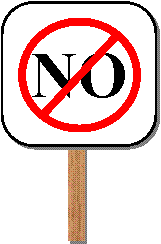 One
can, as the song goes, "accentuate the positive" -- but
only so much.
Meanwhile, "eliminate the negative" is practical advice
for neither speaking
nor writing. In no way can one not use
"not" (see, for example,
Software
Does Not Fail). Indeed... One
can, as the song goes, "accentuate the positive" -- but
only so much.
Meanwhile, "eliminate the negative" is practical advice
for neither speaking
nor writing. In no way can one not use
"not" (see, for example,
Software
Does Not Fail). Indeed...
In any sentence in which it appears, "not" is the most important word....which is precisely why I don't use "n't." Well, maybe I do every once in awhile. Like for the title of this book. See here: suffixed to the word "do,"
the adverb "n't"
has the power to modify both the pronunciation and
spelling of the root
verb. Same for "shall" and "will." That's
not shabby. Everywhere else, though, "n't"
doesn't, so I shan't,
thus assuring that, suffixed and apostrophed, "n't"
won't get underlooked
by listeners and readers. Epilog Every sentence in a message from my brother Alan, a noted playwright, was polluted with n'ts and concluded with "[I] won't re-write any of my scripts on the basis of your article." By happenstance, my brother's rejection
called to mind
the puzzle "Syllables
of Recorded Time"
and inspired a few observations... Suffixed to "will" and "can" and "do," n't saves a syllable...
 In
musical literature, by the way, the syllable isn't saved
but merely borrowed
and repaid ("I can't get no satisfaction") --
occasionally with interest
("Don't you come back no more, no more, no more"). In
musical literature, by the way, the syllable isn't saved
but merely borrowed
and repaid ("I can't get no satisfaction") --
occasionally with interest
("Don't you come back no more, no more, no more").
|